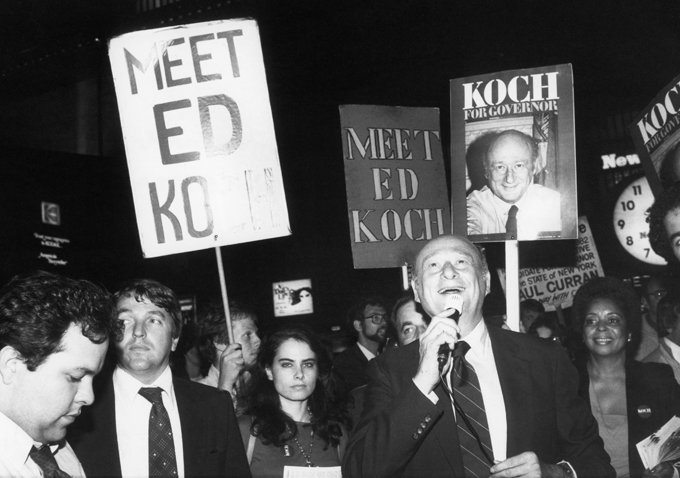
New York City in the mid-to-late 1970s was both a cultural happening and crumbling metropolis. While hip-hop, punk and new wave burbled from the creative corners of the city, elsewhere it was falling apart. The Bronx burned, crime soared, the Son Of Sam was on the loose, everything was teetering on the brink of bankruptcy and an election for mayor loomed. Anyone who wanted the job would be faced with the largely thankless task of rebuilding the city. It would be a ruthless gig, it probably wouldn’t make you popular and there would be opposition every step of the way. Still, there were more than a half dozen candidates putting their hat in the ring to be the next face for one of the greatest cities in America, and perhaps it’s fitting that in the narrative of New York it was an underdog who eventually took the job: Ed Koch. A combination of personality, savvy and bullheadedness helped him win the election and usher him into office 1978, but it was staying true to who he was that kept him there for three straight terms.

Neil Barsky‘s nicely assembled documentary “Koch” is as much a portrait of the man as it is a profile of New York City itself, which came of age from an urban jungle to the sophisticated city we know now largely through Koch’s tenure. Describing himself as a “liberal with sanity,” Koch didn’t seem to fall toward any political persuasion except his own gut. And for a while, this served him well. If anything, Koch didn’t feel the need to kowtow to any political sentiment or prevailing trend. And this would often get him in hot water. His decision to close the close the historic African American Sydenham hospital as a cost cutting measure severely wounded his relationship with voters, and it was an action he would later admit to regretting. “He’s worse than a racist, he’s an opportunist,” quips one of the community leaders, but it wasn’t just people of color Koch had short-sighted vision with. He’s also blamed heavily by those in LGBT circles for not doing enough as mayor during the scourge of the AIDS crisis, particularly given his own rumored homosexuality (which Barksy bravely broaches in a contemporary interview with Koch, who bluntly says it’s no one’s business).
And yet, Koch’s unwavering belief that whatever he was doing was the right choice led to many projects that fundamentally transformed New York City, from a graffiti-blighted—and in some places a nearly apocalyptically devastated—city, into the place we know now. His push for construction of low-income housing still remains seemingly unprecedented, particularly in a city where real estate now seems to be out of reach to all but the elite. He was also at the helm as Times Square began changing from a den of iniquity to the family-friendly tourist attraction it now remains. But his magnetism is probably best described in this anecdote. During the brief Transport Workers Union strike in 1980, Koch recalls seeing a throng of New Yorkers crossing the Brooklyn Bridge just to get to work. He quickly joined in the fray, urging his fellow citizens to keep moving, and show the MTU they couldn’t push anyone around.

Koch’s familiar catchphrase “How’m I doin’?” perhaps perfectly encapsulates a man who really wanted approval from public, but was also confident enough that in asking that question, he’s get an affirmative answer. Barsky’s documentary puts aside flash for insight, and fancy editing for an approach that nears straightforward reportage (hardly a surprise given that the director — making his first film — got his start as a journalist). Both as a portrait of a changing New York City and the man who was at the epicentre of that evolution for over a decade, “Koch” is a delight. It’s a compelling, never dull time capsule that isn’t so much a celebration of Ed Koch, as a honorable and entertaining study of exactly the kind of flawed and principled man that New Yorkers love to get behind. And they did.
Extras: Now on DVD, Zeigeist Films pad out the set with the standard array of interviews, but most enticing of all is the very, very good short documentary “Witnesses NYC.” Digging further into the archives, Barsky’s film collects vintage footage and eye-opening interviews with crack dealers, sex workers, investment bankers, artists, drug addicts and more, all figures who found their lives touched by Koch’s New York City both for good and bad. It’s such a good snapshot, we’d love to see it expanded into a feature, but as it is, it’s a wonderful cross section of the imperfect people who were governed by an imperfect man. [B]

